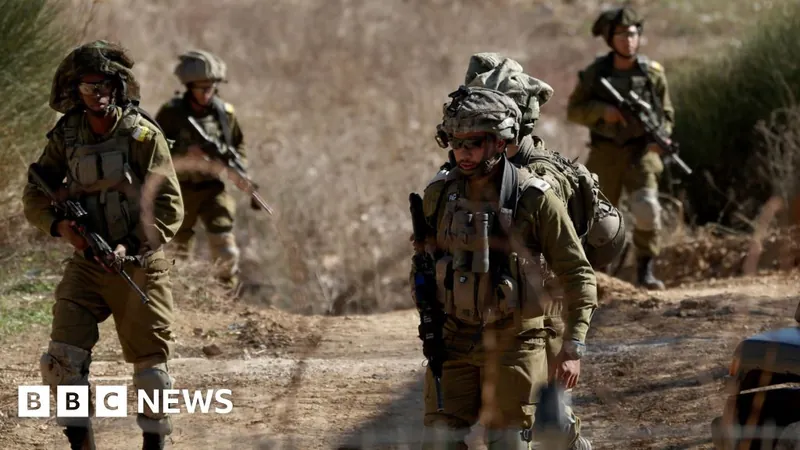
Israel Targets Chemical Weapon Sites in Syria Amid Ongoing Turmoil
2024-12-09
Author: Jia
Israel Conducts Air Strikes in Syria
In a bold move, Israel has confirmed that it is conducting air strikes in Syria aimed at neutralizing suspected chemical weapon and missile sites. Minister of Foreign Affairs Gideon Saar stated that these actions are essential to prevent advanced weaponry from falling into the hands of extremist groups following the recent overthrow of the Assad regime.
Surge in Military Action
Over the past two days, hundreds of airstrikes have reportedly targeted locations across Syria, with significant attention on a facility in Damascus identified as being involved in missile development operations by Iranian scientists. This surge in military action aligns with warnings from the United Nations' chemical watchdog, the Organisation for the Prohibition of Chemical Weapons (OPCW), urging Syrian authorities to secure their stockpiles of chemical weapons.
Reports of Strikes Across Syria
The Syrian Observatory for Human Rights, a UK-based monitoring organization, has reported that the Israeli military launched overnight strikes on multiple locations, stretching from coastal regions to the southern parts of the country. It was noted that Israel initiated these intensive air strikes right after the fall of the former regime, with tactical objectives of dismantling weapon depots to thwart potential threats.
Concerns Over Chemical Weapons Inventory
Although the extent of Syria's chemical weapon inventory remains uncertain, former President Bashar al-Assad is believed to have retained significant stockpiles. After Syria's signature of the OPCW's Chemical Weapons Convention in 2013—following a deadly sarin gas attack that killed over 1,400 people in Damascus—global powers have remained on high alert. That attack primed skepticism, with Western nations attributing responsibility to Assad’s regime while he pinned the blame on opposition forces.
Need for Chemical Security
Despite the gruesome images that illustrated the havoc wreaked by chemical weapons, including documented attacks between 2014 and 2018, which totaled at least 106 instances according to BBC analysis, the OPCW assures that more needs to be done to guarantee the security of chemical materials in Syria. The agency has recently reached out to the Syrian government, emphasizing the urgent necessity of protecting these hazardous compounds.
Israeli Forces in Golan Heights
On the military front, Israeli forces have moved into the demilitarized buffer zone situated in the Golan Heights, an area captured by Israel during the 1967 Six-Day War and later annexed in 1981—an act not internationally recognized until the U.S. did so in 2019. Prime Minister Benjamin Netanyahu has asserted that the 1974 disengagement agreement with Syria has "collapsed" following the rebels’ control of the country and characterized the events as a historic shift in the Middle East.
Official Statements on Military Actions
Saar emphasized that the Israel Defense Forces (IDF) is undertaking very limited actions strictly for security purposes, reaffirming Israel's intention to avoid interference in Syria's internal dynamics. However, Defense Minister Israel Katz made it clear that any potential military threat will be met with a decisive response, targeting strategic weapons systems.
Political Upheaval Following Regime Change
The latest Israeli military operations come amid significant political upheaval, with the Assad regime being toppled by rebel groups, including the Islamist faction Hayat Tahrir al-Sham, which declared Damascus "free." Netanyahu heralded this development as a "historic day" for the region.
Israel's Position on the New Forces
While Israel grappled with its historical association with Assad, having deemed him a preferable alternative amid fears of worse outcomes, Netanyahu professed a willingness to foster peaceful relations with the new forces in Syria. Nonetheless, he stressed that Israel's commitment to its own security remains paramount, pledging robust defense efforts as the situation evolves.
Implications on Regional Security
As the environment continues to shift dramatically, the implications on regional security and the ever-looming threat of chemical weapons remain a focal point for both Israeli and international observers. A delicate balancing act is required to navigate these turbulent waters as efforts to establish stability in Syria unfold.


 Brasil (PT)
Brasil (PT)
 Canada (EN)
Canada (EN)
 Chile (ES)
Chile (ES)
 España (ES)
España (ES)
 France (FR)
France (FR)
 Hong Kong (EN)
Hong Kong (EN)
 Italia (IT)
Italia (IT)
 日本 (JA)
日本 (JA)
 Magyarország (HU)
Magyarország (HU)
 Norge (NO)
Norge (NO)
 Polska (PL)
Polska (PL)
 Schweiz (DE)
Schweiz (DE)
 Singapore (EN)
Singapore (EN)
 Sverige (SV)
Sverige (SV)
 Suomi (FI)
Suomi (FI)
 Türkiye (TR)
Türkiye (TR)